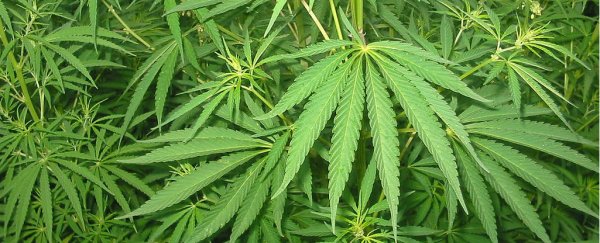An extract of marijuana with no psychoactive properties has been shown to reduce the number of seizures in children with severe epilepsy.
The study, conducted by researchers across the US, followed 137 participants with an average age of 11, who experienced severe epileptic seizures, and were not responding to conventional medication.
Every day for 12 weeks, each participant was asked to take a liquid extract from a cannabis plant, known as cannabidiol. During this period, the number of seizures experienced by the participants dropped by an average of 54 percent.
The results, which will be presented on April 22 at the American Academy of Neurology's annual meeting in Washington, indicate that medication derived from marijuana could be a potential treatment for certain types of severe epilepsy.
Still, the researchers have acknowledged some limitations of the study. For instance, all the participants knew they were taking the extract, and there was no comparison group of people with severe epilepsy who were administered a placebo instead.
"While the findings are promising, more research is needed, such as randomised-controlled trials to help eliminate the possibility of a placebo effect," lead author, Orrin Devinsky, who is the director of New York University Langone Comprehensive Epilepsy Centre in the US, told Agata Blaszczak-Boxe at Live Science.
And although the frequency of the seizures dropped by about half, the extract wasn't without side effects, such as diarrhea, drowsiness, fatigue and loss of appetite, which caused 12 participants to drop out of the trial. About one-fifth of the participants reported experiencing one or several of these side effects.
Raphael Mechoulam, a chemist at the Hebrew University of Jerusalem who wasn't involved in the study, told Amy Nordrum at the International Business Times he was happy the trial was taking place, but said "the side effects are disturbing."
"Pure cannabidiol is not known to cause drowsiness or tiredness," he said.
Mechoulam told the International Business Times he needed clarification on whether the samples administered to patients in the safety test were purified or might have contained THC, the main psychoactive component of marijuana.
The study, which is yet to be published, was funded by GW Pharmaceuticals, a UK-based company that specialises in developing cannabis-derived prescription medicines. This particular extract is known as Epidolex, and has been granted an 'orphan drug' status by the US Food and Drug Administration.
This status can be applied to drugs that have not yet been formally approved, but could be used to treat very rare conditions. In the case of Epidolex, it has been granted the status in relation to a rare type of epilepsy known as Dravet syndrome.
Another study looking at the extract, which was presented at the American Epilepsy Society meeting in late 2014, showed a 32 percent decline in seizure frequency among 23 participants over 12 weeks, Devinsky told Live Science.
While it all sounds promising, the study was pretty small, and the results are likely to be controversial. We'll wait to see what emerges after the results are presented later this month. And we'd also like to see something published.
Sources: International Business Times, Live Science
